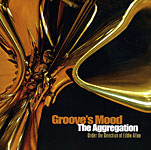Home » Jazz Articles » Profile » John Hebert
John Hebert

Hebert admits to not being totally immersed in Hill's music before the first call for a gig at the 2001 JazzBaltica Festival. But right away, Hebert describes the experience in lofty terms: "It was liberating to play and being validated in a sense of how I was approaching music or how I was hearing music, hearing the bass and my way of thinking of how it should be played. ...And then more gigs came and he just kept calling and I was like, 'hell yeah, let me do these gigs.'" From 2003 until his death, Hebert was Hill's regular sideman, a description that belies the equal partnership that Hill demanded from his musicians, and recorded on the pianist's critically-acclaimed second return to the Blue Note label, Time Lines (with McPherson, reedplayer Greg Tardy and trumpeter Charles Tolliver).
Though Hebert has been ubiquitous in New York in a number of ensembles since the turn of the century, his time with Hill was instructive in a way musicians can't get from playing solely with their peers. "It was a great sort of school for me to go to," Hebert says. "Having that mentorship, if you want to call it that, doesn't exist as much to me anymore, someone from the generation that can bring you into their language, their world and you sort of grow and develop with them and they sort of help you along in that way." And since that experience, Hebert feels that his performing opportunities are a direct result of people wanting his particular approach to the instrument. Speaking of those that employ him, Hebert says, "I'm hoping they know what I'm going to do. I don't really curb what I'm doing for a particular gig. I'm always trying to be myself and play the way I play, to a certain extent. I still want to make everyone else sound good but I try not to compromise musicianship for that."
Hebert also credits Hill for another important point in his development, the assurance to become a leader. Just released, and being celebrated this month, is the bassist's debut album Byzantine Monkey (Firehouse 12). It features his compositions as played by a group of empathetic musicians of long standing: saxists Michael Attias and Tony Malaby with Adam Kolker on flute and bass clarinet for four of ten tunes, and a pair of drummers, Nasheet Waits and Satoshi Takeishi, who plays percussion on the date. When asked if he would have done a record before his time with Hill, Hebert responds frankly: "I would have been too scared though I was making records as a sideman back then. It felt right. I had been writing music, I had done a few gigs on my own in town... It maybe came out with [Hebert's wife] Lo Jen saying, 'why can't you do your own gigs?' or maybe even Andrew said it, 'You should be leading your own band.' ...Talk about no fear; no one can say shit to you when it's your band. ...It's your music, you know how it's supposed to go."
Hebert, despite his burgeoning pedigree, is still developing himself as a musician. He observes: "I'm always trying to listen back and think what am I doing or how can I change that and try different things out. So that's always a struggle. But I think anyone finding their voice comes from playing, just experience. ...So it's a matter of hooking up the right situation and being with people that you vibrate with and that's going to bring out what you do naturally."
 For Hebert, the group on Byzantine Monkey is a perfect example of the above dynamic. All the players come from what Hebert describes as "a very large ensemble that breaks off into factions and you fit yourself in somehow." He first met Waits on that initial Andrew Hill gig. Attias and Takeishi are the remaining two-thirds of Renku. Hebert has played on Kolker's last two albums. Hebert and Malaby are in Attias' group Twines of Colesion. Remarkably, considering the full schedules of all involved, booking the studio time was nailed on the first attempt: "It all just fell into place. I booked two days in the studio and everyone was in town. I mean for these cats that are on the record, to get everyone in the same place at the same time was an act of god." And to this already secure environment, Hebert added the lessons he learned from Hill. "I'm pretty loose when it comes to playing my music. Just count it off and see what happens. ...I trust that the cats in the band will interpret it in the way that would be musical."
For Hebert, the group on Byzantine Monkey is a perfect example of the above dynamic. All the players come from what Hebert describes as "a very large ensemble that breaks off into factions and you fit yourself in somehow." He first met Waits on that initial Andrew Hill gig. Attias and Takeishi are the remaining two-thirds of Renku. Hebert has played on Kolker's last two albums. Hebert and Malaby are in Attias' group Twines of Colesion. Remarkably, considering the full schedules of all involved, booking the studio time was nailed on the first attempt: "It all just fell into place. I booked two days in the studio and everyone was in town. I mean for these cats that are on the record, to get everyone in the same place at the same time was an act of god." And to this already secure environment, Hebert added the lessons he learned from Hill. "I'm pretty loose when it comes to playing my music. Just count it off and see what happens. ...I trust that the cats in the band will interpret it in the way that would be musical." Hebert has another recording to be released in February, a trio with pianist Benoit Delbecq and drummer Gerald Cleaver. But the bassist is not making a transition into full-time leadership, knowing full well that few performers can survive today's market under those circumstances. But he is very encouraged by his first foray. "You see that as possible. You get that first thing out of the way, okay now I see that it is possible to do and it can be rewarding, emotionally or whatever, so think about doing more things. ...It gives you something to shoot for within your own musical spectrum. So you have something to write for. That really is very important, writing your own music and getting your voice across and being heard."
Recommended Listening:
Joe Fiedler, Plays the Music of Albert Mangelsdorff (Clean Feed, 2003)
Michael Attias—Renku (Playscape, 2004)
Andrew Hill, Time Lines (Blue Note, 2005)
Russ Lossing/John Hebert, Line Up (hatOLOGY, 2006)
Mary Halvorson, Dragon's Head (Firehouse 12, 2008)
John Hebert, Byzantine Monkey (Firehouse 12, 2008)
Photo Credit
Scott Friedlander
Tags
PREVIOUS / NEXT
Support All About Jazz
 All About Jazz has been a pillar of jazz since 1995, championing it as an art form and, more importantly, supporting the musicians who make it. Our enduring commitment has made "AAJ" one of the most culturally important websites of its kind, read by hundreds of thousands of fans, musicians and industry figures every month.
All About Jazz has been a pillar of jazz since 1995, championing it as an art form and, more importantly, supporting the musicians who make it. Our enduring commitment has made "AAJ" one of the most culturally important websites of its kind, read by hundreds of thousands of fans, musicians and industry figures every month.


























